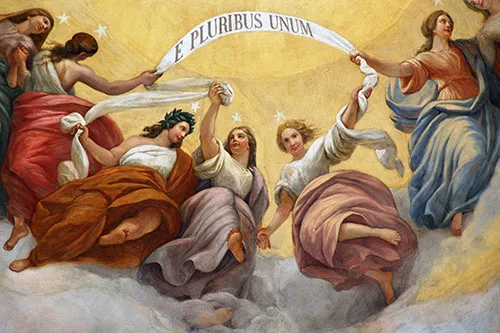In 1978, the first International James Fenimore Cooper Conference was in Oneonta, New York, a beautiful valley on the banks of the Susquehanna River, at the foothills of the Catskills, just minutes from Cooper’s boyhood home of Cooperstown. Since then, over the course of twenty conferences more than 250 scholars and writers, including Leslie Fiedler, James Beard, Thomas Philbrick, and Rochelle Johnson, have presented papers on James Fenimore Cooper, Susan Fenimore Cooper, and the world they represented and helped to create.
Call For Papers
Call for Papers
22nd International James Fenimore Cooper/Susan Fenimore Cooper Conference
September 25-28, 2019
SUNY Oneonta, Oneonta, NY
Keynote Speaker: Sandra M. Gustafson
Professor of English and American Studies, Notre Dame University
Author: Imagining Deliberative Democracy in the Early American Republic
“E Pluribus Unum: Cooper, Cosmopolis, and American Identity.”
Hector St. John de Crevecoeur, writing in the 1770s under the guise of Farmer James, defines the American as an amalgam of all of Europe: men and women who have left behind them “all ancient prejudices and manners” and who have “received new ones from the new mode of life he has embraced.” Using the melting pot metaphor for perhaps the first time, Crevecoeur proclaims, “Here individuals of all nations are melted into a new race of men.” Fifty years later, in 1831, Alexis de Tocqueville affirmed this conception, describing America as “a society formed of all the nations of the world.” However, such optimistic views of cultural mixing were not universally shared.
Anglo-centric leaders of the revolution, including Franklin, Hamilton, and Jefferson, feared that foreigners would, in Hamilton’s words, “corrupt the national spirit.” By the 1840s, nativism emerged as a full-blown political movement.
For the 2019 conference, we want to examine Cooper within this tension between native purity and immigrant amalgamation. Sandra M. Gustafson argues that Cooper’s works embody a “republican cosmopolitanism,” with their representations of multi-ethnic communities and his “ideal of multiracial deliberation” in the Leatherstocking novels. We seek papers that address the role of Cooper and his contemporaries in forging an American identity out of the cultural mixture of overlapping empires and immigration. Topics may include (but are not restricted to) the following:
Nativism and Immigration
Slavery in New York
Gender(s) and the Frontier
(Dis)placing Native American Communities
Populism and Democracy
Exploration and Natural History
Social Conflicts in Frontier Communities
Landscape and Community
We are happy to consider any paper that addresses James Fenimore Cooper’s or Susan Fenimore Cooper’s work and their time. Papers should be 8-10 pages (20 minute presentation). Send paper proposals via e-mail to Dr. Roger W. Hecht (hechtrw@oneonta.edu).
Proposal Deadline is May 15.
FAQs
What is the Cooper Seminar?
The International James Fenimore Cooper and Susan Fenimore Cooper Conference and Seminar is an international conference that brings together scholars from across the country and around the world to share and discuss new ideas about the works and world of James Fenimore Cooper and Susan Fenimore Cooper. Tied to the conference is a senior-level seminar for SUNY, Oneonta students. Students enrolled in the course attend the conference as audience members and receive an immersive introduction to Cooper’s major works and to academic professional life. As audience members, students get an up-close exposure to the give and take of academic exchange and develop an understanding of how intellectual development works. Students also read major works by Cooper and discuss their significance in a seminar led by a visiting Cooper scholar.
How big is the Conference?
Numbers of those attending have varied over the two decades the Seminar has been running. Attendance fluctuates from day to day. In 2011, a high watermark for our conference, twenty nine presenters and over thirty students took part. Our keynote speakers have included scholars Shirley Samuels, Cooper biographer Wayne Franklin, and Cooper Society President Lance Schachterle. Pulitzer Prize winning historian Alan Taylor’s lecture attracted more than three hundred people in 1997.
What is the Registration Cost?
The registration fee of $150 ($110 for graduate students).
What Does My Registration Cover?
- Registration covers admittance to all conference events, parking, computer access, etc.
- Continental breakfast every day, afternoon snacks, coffee/tea
- Transportation & boxed lunch for a field trip to Cooperstown, which includes:
- Admittance to the Fenimore House & The Farmers' Museum in Cooperstown
- Reception on the veranda of the Otesaga Hotel overlooking "Glimmerglass Lake"
- Keynote luncheon banquet at the SUNY Oneonta College Camp
- Conference "chatzkes," including the coveted "Cooper Conference" pen.
Registration does not cover the cost of lodging. We have in the past and will continue to offer this year discounted registration to graduate students & scholars unaffiliated with academic institutions.
